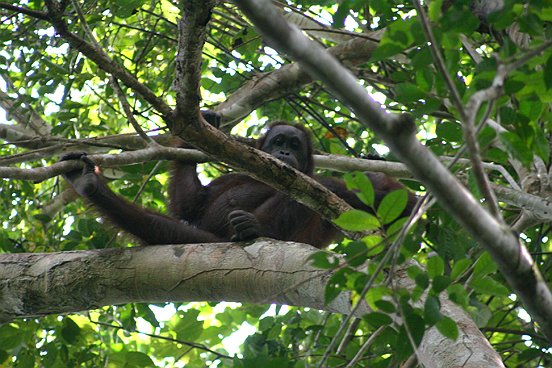Thursday, November 4, 2010
By Bob Lidston
The monsoon-like afternoon storm pelted our small, open boat as we hurried down the narrow croc-infested, brown tributary of Borneo’s Kinabatangan River. I thought: "If the wind picks up, this could get pretty choppy." Just then, Jodi, my bow seat companion said: "I hope the wind doesn’t pick up." We heard a thump and the boat bounced as it struck another submerged log. Our Malay guide, Mincho, held aloft a piece of our little outboard’s propeller. I looked to my right and saw only a pile of sodden clothes covered by a drenched poncho and topped by a limp jungle hat. From inside the mound, I heard Jodi’s voice: "I am going to my happy place now." Then, plowing through mid-stream water hyacinths, we were rewarded. Elephants! Bathing twenty feet from us in the rain-pocked river. Elephants! Lumbering parallel to us in the soaked forest. A days old elephant calf sucking from her mother. A tusked bull, flapping his ears and shuffling great gray legs in annoyance just yards from where we had nosed our craft onto the bank. Mentally, I worried: "If he charges, we will be history." "Maybe they’d better back the boat up," Jodi whispered in echo while snapping photos for "Nat Geo." Pigmy Elephants! Fifty or sixty of them all around us! That was my best day in Borneo.
I was eight or nine years old when I struggled to open the big, white paneled door between the A&P and the jewelry store. An aroma of ground coffee beans wafted from the grocery. Inside the door, a dark stairway rose to the second floor. Each brown asphalt tiled step clanked as my Keds disturbed the loose metal edge strips. My climb ended at a hallway whose walls were clad in knotty pine varnished a deep golden brown. I rushed past the acrid smell coming from the beauty parlor and turned right. At the end of that hallway stood a wooden door with a frosted glass window in its upper half. I don’t think I knew even then what the black lettering on the glass said except for the one word: Library. That door, that word, called to me.
On another day in Borneo, I stood with strangers who had become Jodi, Joy, Harmon, and John, fellow participants in the Terra Incognita Ecotour, and gazed down a slender trail which quickly snaked out of sight into the tangled undergrowth. We started down the trail insulated from the alien environment by our lightweight wilderness pants and LL Bean walking boots. Our pants legs were crammed into high white socks to frustrate the leeches. Our movements were cautious for fear of touching leaves which might host the enormous bloodsuckers attached to our minds. We navigated through the vines, roots, and mud underfoot avoiding the elephant dung and huge footprints. A monkey screamed. The hot, humid air was so dense that it seemed you could slice it into cubes and set them wriggling on a plate like clear gelatin.
Then there was word of something overhead. Forty feet above us, indistinct amidst the foliage, we spied an auburn, shaggy mass. A hairy columnar arm emerged from it and grasped a branch. The auburn mass moved not so much slowly as deliberately and in moving revealed a mostly hairless rounded face with flattened nose, wide mouth, and close-set hazel eyes. It was an orangutan ("man of the forest"). More specifically, this was Jenny, a mother of the forest, for behind her came her five-year-old daughter for whom she seemed to maternally indicate the right branch by which to follow. Mother and daughter rustled through the leaves, branch to branch. Forgetting the leeches, we fled the trail in pursuit, climbing between the forks of a fallen tree and brushing against rope-like vines. Then, standing where we once feared to tread, we raised our jostled binoculars and stared up through them and into those eyes, so human yet, at the same time, not so human. Birds screeched in the distance. Other than that, the forest and our group, were reverently silent.
Jenny sat high above us in a tree, but could she in some way understand what she must have been seeing? On the other side of the near-by creek, surely visible from her perch, stood man’s orderly battalions of palm oil trees ready to complete their assault upon her chaotic life-filled Eden. Jenny, her race, sadly could be leaving us. Emily Dickinson wrote: "Parting is all we know of heaven, And all we need of hell." The Malaysian State of Sabah where we met Jenny is cooperating with researchers and setting aside rain forest to try to save the endangered Orangutan. Our brief people-to-primate encounter was a tiny part of that conservation effort which will never leave me.
I opened the library door and entered a world I had never known. Except for The Sun newspaper, the American Legion magazine, and a few Hardy Boys books my older brother had been given by our cousin, the little bungalow on Oakland Road lacked reading matter. Mrs. Williams, the librarian, asked me what I wanted to read about. "Animals," I answered. I didn’t mean just dogs and cats. I meant wild animals, like my small hard plastic figures of a lion, a tiger, a zebra and others which came with the tan plastic figure of the safari man wearing a pith helmet, and brandishing a whip. That was probably my favorite birthday present ever. Mrs. Williams showed me to some low blonde wooden shelves near a window shaded by a dusty Venetian blind that looked down on East Drive, the main street of the not-at-all exotic Baltimore suburb of Arbutus. I crouched to the floor and found another kind of door: Books. I remember one about monkeys and apes. I remember the drawings in it, including the one of the Orangutan. I recall Zooparade and its color illustration of Judy, the Asian elephant. I lifted my young eyes from the pages and stared out the window toward the too familiar street below, but I didn’t see it. My mental vision was looking elsewhere, seeing dreamscape places and dreamlike creatures I knew I would never really see with my physical eyes.
A perfectly ordinary bus brought us to a perfectly ordinary parking lot. Perfectly ordinary except that we were in Borneo, where Gray Leaf Monkeys watched the lot from the surrounding trees and colorful hornbills flew overhead. A short hike down another jungle trail and over a wooden foot bridge decaying in the equatorial humidity brought our group to a cleared area at the foot of a forested ridge. Well up the steep embankment another Orangutan was only partially hidden by multiple shades of green and brown. Widely scattered on the vegetated hillside, a couple of wood and corrugated metal shacks peeked out from the trees. In the clearing, two large barracks-like buildings constructed of the same materials stood a football field apart, housing the unsavory looking Malays who lived there part of the year. They earned money (some of which they gambled away at a cockfighting ring they maintained) by exploiting a nearby heart of darkness.
Framed by the barracks at the foot of the ridge gaped the stygian, wide mouth of the Gomantong Cave. Inside on its walls, by the tens of thousands, lived Swiftlets, small gray birds whose nests were harvested periodically by the barracks dwellers to be turned into birds nest soup which sells for $30.00 to $40.00 a bowl in China. Just outside the cave’s entrance hung a hangman’s noose, a silent threat to those who would steal the cave’s treasure from its guardians.
We entered the forboding cave single file, flashlights in hand, on a narrow boardwalk following the always helpful Mincho. A sulphurous smell from Swiftlet and bat droppings permeated the air. Under foot, those droppings made the wooden walkway slippery. Its handrail was an uninviting aid because it too was soiled with feces, and, in places, its surface moved. Shining flashlights onto the cave’s gray-black stone walls revealed the same movement. Cockroaches! Large, reddish cockroaches covering the walls, except where the occasional giant centipede had claimed space. Cast toward the cave’s floor, our flashlight beams caught darting rats. Shining those beams upward revealed the Swiftlets, tens of thousands of them, announcing their individual places in a cacophony of chirps which blended into a single unpleasant high-pitched sound like water streaming through a narrow pipe.
As the nightmarish cave widened into a cavern, a shaft of sunlight ahead of us descending from an opening in the roof failed to dispel the darkness spreading inside us. It did, however, draw our eyes toward the ceiling where hung numberless bats. Our flashlights caught them resting upside down with their multi-pointed wings wrapped around their furry, brown bodies. Deep in the cavern we found a ground level recess with two filthy bare mattresses. The interior guards of the cave’s treasure must possess a high tolerance for crawling walls, hideous smells, and gamboling rats. As we drew near again to the cave’s mouth, I looked down from the slimy boardwalk to see in the half-light small crabs scuttling about in the mud. Never had such small animals appeared so sinister.
Outside again, while we stood in the open field between the barracks, evening approached. An eagle sat perched atop a nearby dead tree. A Rhinoceros Hornbill flew overhead. One of the fighting cocks crowed. Flights of Swiflets returned to their dank home. As darkness fell, a nearly full moon rose. From beyond the crest of the forested ridge, probably from where the shaft of light entered the cave, bats began to emerge. These children of the night crossed in front of the moon like an eerie stream of smoke for over two hours. We, one time strangers newly bonded by dreamlike experiences in a nearly unimaginable place, stood in awe. The horror at the heart of the cave’s darkness had been transformed into a spectacle of exotic beauty.
On a clear and almost cool but very dark night, our open boat slipped, nearly without sound, along the Kinabatangan. Insects buzzed their songs. Our lights caught the iridescent blue, gold and orange colors of a Stork-Billed Kingfisher, a half hidden Flat-Headed Cat, and the "fearful symmetry" of the glowing red eyes of a mostly submerged crocodile. I saw these things only physically.
My mental vision was looking elsewhere. It was looking back to where I had been so long ago. My companion in the bow of the boat that night was Joy, a veterinarian from North Carolina. The boy of that long ago library above the A&P knew what a veterinarian was, but he had never met one, nor encountered any other kind of professional, among his neighbors or extended family. I was now sitting next to one, in Borneo, in a boat on a river whose name is hard to pronounce, in the black velvet darkness just feet away from animals I had only known as pictures in books. I told Joy that I had to figuratively pinch myself to make certain it wasn’t all a dream. I could not then, and still cannot, grasp how the old dreams became real. At that moment, however, in that place, the red-haired boy in the library holding his animal books and the gray-haired man reveling in his experiences had become one.
BOB AND HIS NEW FRIENDS ON THE BANKS OF THE KINABATANGAN RIVER







